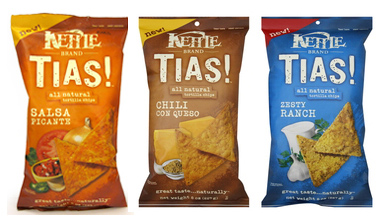Top Class Actions’s website and social media posts use affiliate links. If you make a purchase using such links, we may receive a commission, but it will not result in any additional charges to you. Please review our Affiliate Link Disclosure for more information.

U.S. District Judge Saundra Brown Armstrong rejected the TIAS tortilla chip class action lawsuit on May 28, saying Plaintiff Dominika Surzyn did not specify which tortilla chips she had purchased, nor when she purchased them, nor any other facts surrounding the marketing or advertising on which she may have relied in purchasing the chips. Surzyn will be allowed to amend her claims and try again.
In her TIAS tortilla chips class action lawsuit, filed in January 2014, Surzyn was very detailed about the chemical content of Kettle’s TIAS chips. She named five varieties of Kettle TIAS Tortilla Chips — Nacho Cheddar, Zesty Ranch, Salsa Picante, Sweet Baja Barbeque, Chili con Queso — which contain the “All Natural” claim, which she said was “false, misleading, and likely to deceive reasonable consumers in the same respect–that being due to their unnaturalness for containing unnatural, synthetic, and/or artificial ingredients. The products are simply not ‘All Natural,’ therefore rendering defendant’s uniform claim unlawful, fraudulent, unfair, deceptive, misleading, and/or likely to deceive reasonable consumers.”
The TIAS class action lawsuit describes the two synthetic ingredients, maltodextrin and dextrose; “Maltodextrin is a saccharide polymer that is produced through partial acid and enzymatic hydrolysis of corn starch. The acid hydrolysis process is specifically deemed to be a relatively severe process that renders an ingredient no longer ‘natural.’”
The Kettle TIAS class action lawsuit also describes dextrose; “Dextrose is enzymatically synthesized in a similar manner, crystallizing D-glucose with one molecule of water. Synthetic chemicals are often used to extract and purify the enzymes used to produce maltodextrin and dextrose. The microorganisms, fungi, and bacteria used to produce these enzymes are also often synthetically produced.”
In finding Kettle’s argument to dismiss the class action persuasive, Judge Armstrong wrote that Surzyn failed to plead with particularity. “The Complaint does not specify which of the Chips, if any, Plaintiff purchased,” Armstrong wrote, “and instead alleges only that ‘Plaintiff has purchased one or more of the Products during the Class Period.’ This vague allegation is insufficient. At a minimum, Defendant is entitled to fair notice of the particular product Plaintiff purchased.”
The judge was dismissive of Kettle’s claims about the term “All Natural” and the company’s contention that it would be implausible for a consumer to be misled by the term “All Natural,” finding that the use of the term depended upon the context. In the context of the tortilla chips, she found that a reasonable consumer might be misled and that further findings would be appropriate to hear as pleadings.
Judge Armstrong also found Kettle’s argument that its detailed “Natural Promise” on its packaging could be seen as a disclaimer of sorts, allowing it to define natural for the consumers.
“As noted, the ‘Our Natural Promise’ purports to convey… that the Chips contain ‘[o]nly all natural colors and flavors’ and ‘[r]eal food ingredients,'” Armstrong wrote. “It is unclear how these representations resolve any ambiguity regarding the meaning of ‘All Natural.’ If anything, the Our Natural Promise statement serves to further mislead the consumer—not clarify what is meant by that term. The Court is thus not persuaded that the ingredient panel and the Our Natural Promise statement demonstrate, as a matter of law, that no reasonable consumer would likely be deceived by Defendant’s characterization of the Chips as being ‘All Natural.'”
The Kettle TIAS class action lawsuit accused the company of selling the chips in violation of California’s False Advertising Law; the fraudulent and unfair prongs, as well as the unlawful prong, of the Unfair Competition Law; the California Legal Remedies Act; and negligent misrepresentation.
The plaintiff seeks to represent a Class comprised of all California residents who purchased the Chips from January 9, 2010 until the Class is certified.
The plaintiff is represented by Benjamin M. Lopatin of The Law Offices of Howard W. Rubinstein PA.
The Kettle TIAS Tortilla Chips Class Action Lawsuit is Dominika Surzyn v. Diamond Foods Inc., Case No. 4:14-cv-00136, in the U.S. District Court for the Northern District of California.














